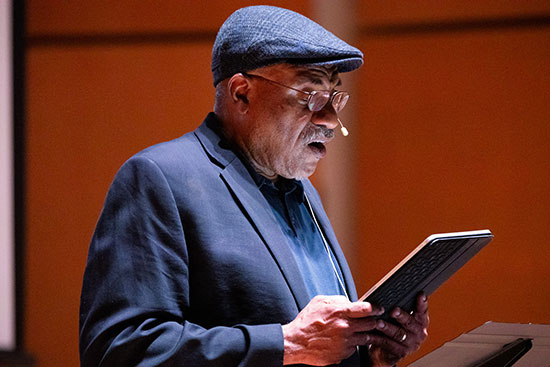Formative Moments: Kwame Dawes Named Jamaica Poet Laureate
 An immigrant from Ghana in the early 1970s, Kwame Dawes came of age in Jamaica at the same time that the Caribbean Island nation was starting to come of age itself.
An immigrant from Ghana in the early 1970s, Kwame Dawes came of age in Jamaica at the same time that the Caribbean Island nation was starting to come of age itself.
His adolescent formations of thought around faith, identity, sexuality, politics, family and social structure occurred at the same time that his adopted country was facing the same adolescent battles after gaining its independence from Great Britain in 1962.
It was Rastafarianism. It was developing an identity away from colonial influences. It was reggae music. It was a reconnection to the African roots that many Jamaicans like Dawes had.
Jamaica greatly influenced Dawes, a longtime faculty member in Pacific University’s Master of Fine Arts in Writing program. Now Jamaica has honored him for his influence on its art and culture by naming Dawes the country’s Poet Laureate. His three-year term runs through 2027.
“I would say it’s one of the most important honors (I have received),” said Dawes, who has been part of the Pacific MFA faculty since 2009. “My formative years and most of what I understand about myself, some of those most important things really took place in Jamaica.
“When I think of all of the other writers who have been poet laureates in the last few years, Lorna Goodison, Olive Senior and Mervyn Morris, they are all remarkable writers and people who mean a lot to me. It means a lot to be recognized by your own, by people who call you your own people.”
The designation is the latest in a long line of honors that Dawes has received for his contributions to the world of poetry and literature. Dawes received the Musgrave Silver Medal in 2004 for his contribution to the arts in Jamaica. The Jamaican government awarded him the Order of Distinction, Commander class, in 2022.
Within the literary world, Dawes’ awards include the Hollis Summers Poetry Prize, a Pushcart Prize, the Commonwealth Writers Prize and the Windham-Campbell Literature Prize. Dawes was selected in 2018 as a chancellor of the Academy of American Poets and was named the online literary magazine Brittle Paper as its 2022 Literary Person of the Year.
Dawes also earned an Emmy Award in 2009 in New Approaches to News & Documentary Programming: Arts, Lifestyle & Culture, for his work on a documentary on HIV and AIDS in Jamaica.
Dawes described the poet laureate as a “poet on demand” for the government, composing works celebrating milestone moments in the nation. The laureate also develops initiatives to celebrate the art and love of poetry and, most importantly, make it more accessible to the masses.
His work with the African Poetry Book Fund, of which he was a founding editor in 2014, has inspired what he hopes will be his primary project as poet laureate: developing an inventory of poetry native to Jamaica and bringing light to works that have been lost or otherwise fallen through the stanzas.
“This will involve looking at the way in which Jamaican poets established themselves in the landscape of Jamaica. This will involve retrieving the hidden history of poetry writing in Jamaica and then building an interest in poetry across the nation,” Dawes said. “It’s work I have been doing for years, but I think we will find a way to enhance that work.”
Dawes’ work as poet laureate is an extension of his longtime dedication to promoting the art of poetry, especially in the BIPOC community. He was involved with the start of the African Poetry Book Fund, designed to promote and publicize the poetic arts of Africa. He is also co-founder and artistic director of the Calabash International Literary Festival.
Dawes, who also teaches at the University of Nebraska-Lincoln as the George Holmes Distinguished Professor of English and Glenna Luschei Editor of Prairie Schooner, is one of many highly decorated authors that comprise the faculty of Pacific’s low-residency MFA program, which celebrates its 20th anniversary in June.
While Dawes could teach just about anywhere he wishes, it is the model of program that keeps him involved at Pacific. The combination of the program’s two annual 10-day residencies, mentorship and one-on-one work with faculty allows students to hone their craft without sacrificing their current life experience. In fact, Dawes believes, the ability to weave life experience and writing enhances the art.
“You don’t stop your job, you don’t stop your life to write. In a sense you are simulating exactly what it’s like to be a living writer who has to make a living,” Dawes said. “This is especially true of poets. You have to find other ways to make a living and yet still be generative. I think the Pacific program is brilliantly constructed to do that.”
Dawes added that the program is made richer by its intentional approach to recruit faculty members and students of diverse backgrounds, which he takes great pride in.
“I thought it was an ethical and moral responsibility for the institution to be a welcoming space and an encouraging space for writers of color,” Dawes said. “What I have seen in the last 15 years has been this remarkable, calculated and very deliberate effort to diversify the program. This took a lot of work and a lot of labor but the commitment was always there.”
An important aspect for a poet who has made diversity and honoring his home country two of his artistic cornerstones.


